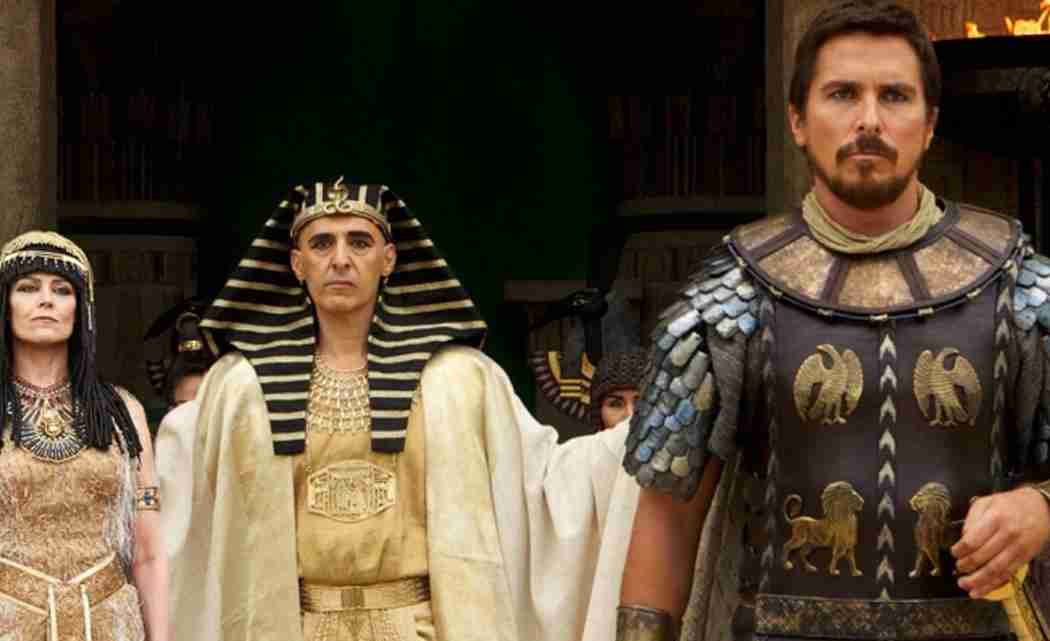They say the road to hell is paved with good intentions. It’s debatable how good Ridley Scott’s intentions were when he decided to tell the biblical story of Exodus as a theatrical action flick, replete with elaborate sets. No doubt, 20th Century Fox paid good money (the film had a $140 million budget according to imdb.com) to see Exodus: Gods and Kings come to life; chariots and all.
What they got was a piece of artistic drivel that is sure to offend Christians and anyone whose ever seen Ben Hur or The Ten Commandments.
The offense isn’t necessarily anti-Semitic or anti-Christian. It’s more so about the fact that screenwriters Adam Cooper, Bill Collage, Jeffrey Caine, and Steven Zaillian took so much creative license with the story that it’s totally out of whack. Moses (played by Batman himself, Christian Bale) doesn’t carry a staff, but a sword. The meaning being that Moses is always ready for a fight. Of course, in the biblical story, the real Moses uses a staff because he had been a shepherd and he was letting God fight his battles. Apparently, a humbled Moses wouldn’t make a good action movie hero by Scott’s standards.
Likewise, other story tent poles, like Moses using his staff to part the Red Sea, never actually occur. Our protagonist and his newly acquired “people” cross the Red Sea by way of shallow water that somehow manages to disappear, then becomes a wall of rushing water. And, Moses speaks perfectly and clearly; unlike the real Moses who had a speech impediment.
The film also takes pride in highlighting the seven plagues that God visited upon the Egyptians, like the sea going red, the locusts, boils on their bodies, and the death of the first born. This and some not-so-nice scenes of frogs and alligators eating people are brought to its audience in vivid 3D. It will test one’s upchuck reflexes.
By the way, a (dirty) little boy named Isaac Andrews plays the supposed messenger of God. In the story, God is supposed to be a voice within a burning bush that never burns. This brings me to casting, which had me scratching my head. John Turturro is a lovable guy, but his accent couldn’t save his Pharaoh Seti. Bale as Moses looks more like a homeless man, than a Hebrew or an Egyptian. Will someone, please, wash Christian Bale’s face?
Sigourney Weaver plays Queen Tuya but doesn’t really muster up the presence to embody someone who’s supposed to be regal. Likewise, Joel Edgerton as Pharaoh Rhamses looks a lot like Yule Brenner, but his character’s use of slang just cheapens the whole experience of the film. Making your actors use British accents, while speaking slang during a historical period piece does not a good biblical film make.
None of these characters seems to connect with the actors that are playing them. That’s unfortunate, because given a better script the bad casting wouldn’t be so obvious. The only bright spot in the film is Ben Kingsley’s portrayal of Nun, an elder of the Hebrew people.
Scott, in all of his talent, has managed to make a film that is so terrible, it’s actually laughable. Most filmmakers, when they set out to make a film based on biblical stories, usually read the Bible and then consult with religious leaders to make sure they are depicting the story accurately. It appears the screenwriters were trying so hard to set themselves apart from all of the religious films that the film has suffered and they’ve missed the whole point of the story: God will deliver His people, not man.
It would be something if some of the historical elements (ahem, Moses’ staff) were kept in the film to pay homage to the Bible book that the films is based on. And, it wouldn’t piss people off who are familiar with the story. Instead, the audience gets Moses 2.0, complete sword and Batman-like voice.
With its inconsistent lighting, mis-casting, total disregard for its source material, and hurl-worthy 3D, this film is terrible. Scott, who dedicated the film to his late brother Tony, probably had good intentions for making Exodus, but he allowed his need for creative license to crowd his judgment for what would have been a nice, true-to-form biblical story. Instead, it’s a mish mash of events weaved together. So, the next time someone decides to tell a biblical story, here’s a suggestion: make sure you understand the source material first.













No Comment